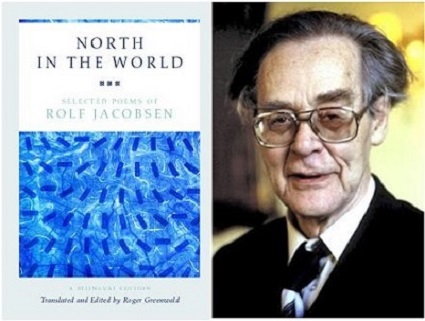
Ars Poetica


Ars Poetica

In Raspberry Season
By Rolf Jacobsen
Translated by Roger Greenwald
In raspberry season
the wasps come into the house
and can’t find their way out again; day after day
they dash against the windowpanes, sooma-sooma-soom
until we can sweep them out on the dustpan.
For you and me too
there are barriers we can’t understand.
Time after time we throw ourselves against something we
cannot see
until they sweep us out one day on the dustpan.
Unless, by chance,
someone on this earth or in the clouds
raises a window so we get through.
Rolf Jacobsen was one of Norway’s greatest modern poets. Garnering the highest praise of critics, Jacobsen won many of Norway’s and Sweden’s most prestigious literary awards, including the Swedish Academy’s Dobloug Prize and the Grand Nordic Prize, also known as the “Little Nobel.” But he also has earned a wide popular audience, because ordinary readers can understand and enjoy the way he explores the complex counterpoint of nature and technology, progress and self-destruction, daily life and cosmic wonder.( from introduction by Roger Greenwald)
I loved the apt imagery with which the poet depicts a human situation. There are many barriers in our day to day life: bureaucracy, red tapism, caste, gender, nationality, social stigma etc apart from psychological and emotional barriers. Think of millions of ordinary people who beat against these barriers and seek help. Perhaps some good Samaritans or the Almighty will see our plight and open the doors for our salvation.
Roger Greenwald is a renowned American poet and an award winning translator of Scandinavian poetry.

Source : Ref: North in the World: Selected Poems of Rolf Jacobsen - A Bilingual Edition. Translated and edited by Roger Greenwald. University of Chicago Press, 2002. ISBN 0-226-39035-7. Winner of the Lewis Galantière Award from the American Translators Association.

I really love you, believe me…
Sheltering-in-place #1
By Attila Jozsef (1905 -1937) Hungarian Poet
translated from Hungarian by John Batki
I really love you,
believe me. It is something I inherited
from my mother.
She was a good woman. After all,
she was the one who brought me
into this world.
We may compare life
to a shoe, or a laundromat,
or whatever.
Nonetheless, we love it
for reasons of our own.
Saviours, there are
enough of them to save the world
three times a day and still nobody knows
how to light a match. I’ll have to give up
on them.
It would be nice
to buy tickets for a trip to the
self. It must be somewhere inside us.
Every morning I wash
my thoughts
in cold water.
That way they come out fresh as a daisy.
Diamonds can sprout
good warm songs,
if you plant them under your heart.
Some people will stay
pedestrians no matter what they ride,
horse, car or airplane.
Me, I just lie around
in the morning song of larks
and still make it over the abyss.
Let us carefully save our
true souls
like our best suit of clothes
to keep them spotless for the days of
celebration.
Attila József was one of the greatest Hungarian poets of the 20th century
József was attracted by Marxist ideology and became a member of the then-illegal Communist Party. When his first poems were published, he was tried for blasphemy. In his own poetry József presented intimate pictures of proletarian life. He immortalized his mother, a poor washerwoman, and made her a symbol of the working class. He created a style of melancholy realism, infused with irrationality, through which he was able to express the complex feelings of modern men and reveal his own faith in life’s essential beauty and harmony. At the age of 32 he committed suicide throwing himself under a train.
I fell in love with this poem while reading it yesterday in the book "Against Forgetting, Twentieth Century Poetry of Witness edited by Carolyn Forche. Attila Jozsef uses unusual and comically pedestrian analogies to compare life to 'to a shoe, or a laundromat'(coin-operated washing machines and dryers for public use). This is as if life is like something you buy in a store or a shoe you slip in and slip out or some clothes you wear and wash again. There are some lines that have a ring of truth like:
'Some people will stay
pedestrians no matter what they ride,
horse, car or airplane.'
The poet here mocks about leaders and politicians(saviors) who promises but never delivers.
What is arresting in this poem is the tender and poignant last lines. While our life could really be a mess, our souls are something special to be worn on momentous occasions. This poem thus becomes a celebration of the soul within the self.